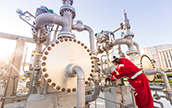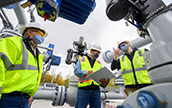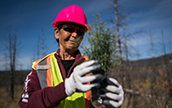Our Powering Progress targets
In February 2021, Shell launched Powering Progress, which sets out our strategy to accelerate the transition of our business to net-zero emissions, in step with society, purposefully and profitably. It is designed to integrate sustainability with our business strategy, in support of our purpose – to power progress together by providing more and cleaner energy solutions. Targets and commitments under Powering Progress include:
Achieving net-zero emissions
Working with our customers and across sectors to accelerate the transition to net-zero emissions.
- Our climate target is to become a net-zero emissions energy business by 2050, in step with society’s progress in achieving the goal of the UN Paris Agreement on climate change.
- We have set targets to reduce the carbon intensity (Net Carbon Footprint) of the energy products we sell. This includes short-term targets of 3-4% by 2022, 6-8% by 2023, and 9-12% by 2024 (compared with 2016). It also includes medium- and long-term targets of 20% by 2030, 45% by 2035, and 100% by 2050 (compared with 2016), in step with society.
- In October 2021, we announced an absolute emissions reduction target of 50% by 2030, compared with 2016 levels on a net basis. This new target covers all Scope 1 and 2 emissions under Shell’s operational control and complements our existing carbon-intensity targets.
- We have linked the pay of more than 16,500 staff to our target to reduce the carbon intensity of our energy products by 6-8% by 2023, compared with 2016.
- We believe our annual oil production peaked in 2019, and we expect our total oil production to decline by 1-2% a year until 2030.
- In 2022, we aim to invest $3 billion in our Renewables and Energy Solutions business. We aim to increase our power sales to 560 terawatts a year by 2030.
- Our aim is to use nature-based solutions to mitigate emissions of around 120 million tonnes of CO2 per year by 2030.
- We seek to have access to an additional 25 million tonnes a year of carbon capture and storage (CCS) capacity by 2035 – equal to 25 CCS facilities the size of our Quest site in Canada.
- We have committed to bringing forward the target to eliminate routine gas flaring from our Upstream operated assets from 2030 to 2025. This is an acceleration of our previously stated obligation to the World Bank’s Zero Routine Flaring by 2030 initiative.
- By 2025, we expect to have kept the methane emissions intensity of Shell-operated assets to below 0.2%.
Respecting nature
Protecting the environment, reducing waste and making a positive contribution to biodiversity.
Biodiversity
- Our ambition is to have a positive impact on biodiversity.
- Our new projects in areas rich in biodiversity – critical habitats – will have a net positive impact on biodiversity, starting implementation in 2021.
- Our nature-based solutions projects, which protect, transform or restore land, will have a net positive impact on biodiversity, starting implementation in 2021.
- We will replant forests, achieving net-zero deforestation from new activities, while maintaining biodiversity and conservation value, starting implementation in 2022.
Water
- Our ambition is to conserve fresh water by reducing consumption and increasing reuse and recycling.
- We will reduce the amount of fresh water consumed in our facilities, starting by reducing fresh-water consumption by 15% by 2025 compared with 2018 levels in areas where there is high pressure on fresh-water resources.
- We will assess options for further reduction goals by the end of 2022.
Circular economy and waste
- Our ambition is to use resources and materials efficiently and to increase reuse and recycling.
- We are aiming for zero waste by reducing waste generated and increasing reuse and recycling in our businesses and supply chains. We will set goals for waste reduction, reuse, and recycling by the end of 2022.
- We will work with our suppliers and contractors to help end plastic waste in the environment:
- By 2030, we will increase the amount of recycled plastic in our packaging to 30% and ensure that the packaging we use for our products is reusable or recyclable.
- We will increase the amount of recycled materials used to make our products, starting with plastics. Our ambition is to use one million tonnes of plastic waste a year in our global chemicals plants by 2025.
Air quality
- We are helping to improve air quality by reducing emissions from our operations and providing cleaner ways to power transport and industry.
Collaboration and reporting
We are strengthening external partnerships and improving transparency on performance.
- Supply chain: We will include requirements in our purchasing policies to reflect our environmental framework, and take the energy efficiency, material efficiency and sustainability of products into consideration in our purchases.
- External partnerships: We will ensure external partnerships inform key areas of development and delivery of our ambitions.
- External reporting: We will transparently report performance in our annual Sustainability Report.
Powering lives
Powering lives through our products and activities, and by supporting an inclusive society.
- Our ambition, by 2030, is to provide reliable electricity to 100 million people in emerging markets who do not yet have it.
- We aim to increase racial and ethnic representation across our workforce so that we better reflect the communities in which we work and live.
- Shell is working towards achieving 35% representation of women in our senior leadership by 2025 and 40% by 2030.
- By 2030, we will make our global network of service stations more inclusive and accessible to customers with physical disabilities.
- At Shell, we seek to provide a safe, caring and inclusive environment for LGBT+ and PWD (people with disabilities) staff so that they can be themselves and reach their full potential.









